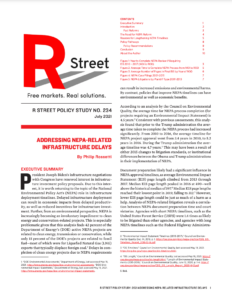Full Title: Addressing NEPA-Related Infrastructure Delays
Author(s): Philip Rossetti
Publisher(s): R Street Institute
Publication Date: July 7, 2021
Full Text: Download Resource
Description (excerpt):
President Joseph Biden’s infrastructure negotiations with Congress have renewed interest in infrastructure investment policy proposals. Due to this interest, it is worth returning to the topic of the National Environmental Policy Act’s (NEPA) role in infrastructure deployment timelines. Delayed infrastructure deployment can result in economic impacts from delayed productivity, as well as reduced incentives for infrastructure investment. Further, from an environmental perspective, NEPA is increasingly becoming an involuntary impediment to clean energy and conservation-related projects. This is especially problematic given that this analysis finds 42 percent of the Department of Energy’s (DOE) active NEPA projects are related to clean energy, transmission or conservation, while only 15 percent of the DOE’s projects are related to fossil fuel—most of which were for Liquefied Natural Gas (LNG) exports that typically displace foreign coal. Delays in completion of clean energy projects due to NEPA requirements can result in increased emissions and environmental harms. By contrast, policies that improve NEPA timelines can have environmental as well as economic benefits.
From a policy perspective, the data reveals that document preparation difficulty is likely a major explanation for NEPA timelines, but there is also evidence to show that high quality NEPA documents are less likely to be litigated against. This creates a catch-22 where policies that force shorter NEPA timelines or EIS page counts may, ironically, create more difficulties for NEPA approval as courts may require EIS revision. Importantly, the federal government is more likely to lose on cases related to EIS adequacy than other NEPA-related cases (such as standing or jurisdiction), indicating that document adequacy concerns may be well founded. Additionally, 59 percent of all NEPA cases are brought by public interest groups that may have a high appetite for litigation, and who are well equipped to prosecute cases where document inadequacy is suspected.
